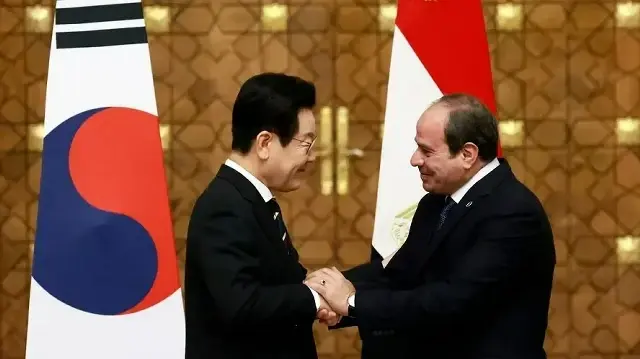South Korean President Lee Jae Myung and Egyptian President Abdel Fattah al-Sisi have committed to deepening bilateral ties, with a particular focus on expanding defense industry cooperation and promoting regional stability. The agreement came during a summit meeting in Cairo on Thursday as part of President Lee’s four-nation international tour, signaling a significant strengthening of relations between the two countries.
Expanding Defense Collaboration
A central outcome of the talks was the commitment to broaden defense cooperation beyond existing projects. President Lee expressed hope that their partnership, “already exemplified by the joint production of the K-9 self-propelled howitzer, will expand to include FA-50 aircraft, the Cheongeom air-launched anti-tank guided missile and others.” This expansion follows Egypt’s $1.7 billion contract signed in 2022 with South Korea’s Hanwha Defense Co. for K9 howitzers, with deliveries expected next year. President Sisi reciprocated interest in further joint weapons production initiatives.
Economic and Humanitarian Partnerships
Beyond defense, the two leaders advanced discussions on a Comprehensive Economic Partnership Agreement (CEPA), signing a joint declaration to accelerate negotiations. President Lee described the prospective trade pact as “an important institutional foundation supporting broad economic cooperation” and expressed hope that formal talks “can begin as soon as possible.” The summit also addressed humanitarian concerns, with South Korea pledging cooperation to help address the refugee crisis in Gaza. Additional memoranda of understanding were signed covering cultural and educational exchanges.
President Lee used the occasion to unveil a broader Middle East cooperation initiative dubbed “SHINE,” representing stability, harmony, innovation, network and education. Speaking at Cairo University, he outlined Seoul’s commitment to strengthening ties with the region, which he described as crucial for energy security and trade. The South Korean leader also addressed peace efforts on the Korean Peninsula, stating his government aims “to end the era of hostility and confrontation between the two Koreas and open a new era of peaceful coexistence and shared growth” through a phased approach to denuclearization.
